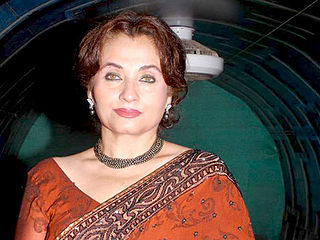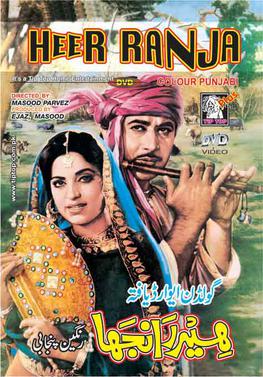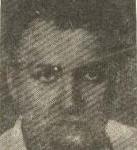Related Research Articles

Pir Waris Shah was an 18th-century Punjabi Muslim Sufi poet of the Chishti order, known popularly for his contribution to Punjabi literature.

Heer Ranjha is one of the four popular tragic romances of the Punjab. The other three are Mirza Sahiban, Sohni Mahiwal and Sassi Punnun. There are several poetic narrations of the story; by far the most famous being Heer by Waris Shah written in 1766. It tells the story of the love between Heer Sial and Dheedo Ranjha.

Khwaja Khurshid Anwar was a Pakistani filmmaker, writer, director and music composer who earned recognition in both India and Pakistan. He is credited as being one of the most original and inventive music directors of his generation. He was the Programme Producer (Music) at (AIR), All India Radio or Akashvani, Delhi in 1939.

Kuldeep Manak, also spelled as Kuldip Manak, was an Indian singer best known for singing a rare genre of Punjabi music, kali, also known by its plural form kalian or kaliyan. Manak is generally regarded as one of the greatest Punjabi artists of all time. His high pitched strong voice was unique, and instantly recognisable. A statue of Manak has been erected in Ludhiana near his residence as a tribute.

Harbhajan Singh Mann is an Indian-Canadian singer, actor and film producer associated with Punjabi music and cinema. His movies include Jee Aayan Nu (2002), Asa Nu Maan Watna Da (2004), Heer Ranjha (2009) and Jag Jeondeyan De Mele (2009).
Gul Hamid (1905-1936) was an Indian actor. He started his acting career in silent films and later played leading roles in talkies. He had many honors to his credit. He acted in Heer Ranjha, the first film produced in Punjabi and in Seeta, a talkie that won an honorary diploma in the 1934 Venice Film Festival and that was also the first Indian film shown at an International film festival. Hamid also wrote the script, acted in, and directed the film Khyber Pass (1936). Hamid died of Hodgkin's Disease in 1936.

Salma Agha is a British singer and actress who worked in Pakistani and Indian films in the 1980s and the early 1990s.

Punjabi cinema, also known as Pollywood or Punjwood, is cinema dedicated to the production of motion pictures in the Punjabi-language widely spoken in the Indian state of Punjab. It is based in Amritsar, Ludhiana, and Mohali.
Damodar Gulati also known as Damodar Das Arora, was a Punjabi Hindu poet. He hailed from Jhang. He lived during the reign of Mughal king Akbar.

Heer Ranjha is a 1970 Pakistani Punjabi film, based on the classic epic story of Heer Ranjha by the Sufi poet Waris Shah.

Abdur Rashid Kardar (1904–1989) was an Indian film actor, director and producer. He is credited with establishing the film industry in the Bhati Gate locality of Lahore, British India.
The Ranjha are a Jat clan of Punjabis, found in Punjab region of present day Pakistan.
Ahmad Rahi was a Punjabi poet and writer from Pakistan.
Heer is a 1955 Pakistani Punjabi-language film produced by J.C. Anand, directed by Nazir starring Swaran Lata and Inayat Hussain Bhatti in title roles.
Sheela, also known as Pind Di Kurhi, sometimes spelled as Pind Di Kuri or Sheila, is a 1935 Punjabi film directed by K.D. Mehra. It is the first Punjabi sound film and was made in Calcutta and released in Lahore. Mubarak Ali Khan and K.D. Mehra composed the music. Baby Noor Jehan was first time introduced as an actress and singer.
Heer Syal is a pre-partition Punjabi film released in 1938. It is the second film directed by Kishan Dev Mehra, along with assistant director M. M. Billoo Mehra. It starred new actors Balo and M. Ismail, with Noor Jehan, Haider Bandi and Eiden Bai. It is based on Heer Ranjha - a tragic epic romance story from Punjab by Waris Shah.
Heer Ranjha is a tragic romance folktale from the Punjab about the lovers Heer and Ranjha, best known through the classic poem collection of the same name by Waris Shah, an 18-century Punjabi-language poet.

Rafiq Ghaznavi was a British Indian and later a Pakistani musician and actor in pre-partition Indian cinema and later Pakistani cinema.
Playart Phototone was a film studio established in 1929 by Abdur Rashid Kardar.
Mohammad Ajmal Qadri was an Indian-born Pakistani actor, best known for his role as Kaido in classic Pakistani Punjabi film Heer Ranjha.
References
- 1 2 3 4 "Heer Ranjha (1932 film)". Complete Index To World Film (CITWF) website. Archived from the original on 20 December 2012. Retrieved 3 October 2022.
- 1 2 3 4 5 6 7 "Heer Ranjha (1932 film)". Pakistan Film Magazine website. Archived from the original on 28 June 2017. Retrieved 3 October 2022.
- ↑ Yeh Un Dinon Ki Baat Hai. Bloomsbury Publishing. 2018. ISBN 9789387471054.
- ↑ Renu Saran (2014). History of Indian Cinema. Diamond Pocket Books. ISBN 9789350836514.